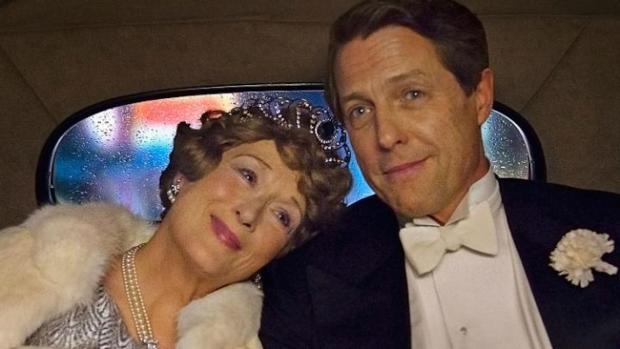Passion in the Key of Off: Florence Foster Jenkins
I didn’t expect to find some of what Stephen Frears’ Florence Foster Jenkins actually has to offer. But, to mention one of its primary surprises, I don’t think I should be blamed for not anticipating Hugh Grant’s overwhelmingly successful, engaging, witty, and eventually moving performance, the best one in this movie, if only by a slender margin. After all, this is a vehicle with Meryl Streep in the title role. Meryl Streep!
Frears’ movie is a semi-fictionalized portrayal of events in the late life of New York heiress and musical arts benefactor Florence Foster Jenkins, who was also a self-styled, dedicated, and incomparably bad opera singer. Jenkins pursued her amateur singing career seemingly unconscious of her abysmal lack of gifts, skill, and pitch.
Over a number of years in the first half of the 20th century, a coterie of often wealthy and important friends and associates shielded Florence from what might now seem a rather unavoidable recognition of her awfulness. It didn’t hurt that she was a generous patron of New York’s classical music and musicians. In one early scene, Arturo Toscanini, no less unctuously solicits a contribution from her for one of his concerts and then expresses his regret at not being able to attend Florence’s upcoming private recital because he must rehearse his orchestra. “On Saturday night?” asks St. Clair Bayfield (Grant), Florence’s much younger husband and manager. “We rehearse all the time,” the maestro assures him as he hurriedly departs with a check in hand.
It’s St. Clair who assiduously sustains his wife’s amateur career and illusions. He’s abetted by a polite, sometimes purchased, under-the-table conspiracy of silence, as well as the baffling admiration for Florence’s singing among many of the older members of her private arts organization. (This may bring to mind the successes of P. T. Barnum and Donald J. Trump.)
Grant gives us a knowingly plummy, archly witty St. Claire at first, and then adds emotional shading and personality complications, and brings off the transitions with a sense of easy mastery, however much work it took. This is probably the part of Grant’s career; he’ll probably never have an opportunity like this again.
Which isn’t to sneeze at what Streep has accomplished. It’s hard to imagine anyone doing Florence any better or as well. Streep lets her become the butt of the joke even as she makes her a painfully sympathetic, and even brave, figure. And these two stars are almost exquisitely assisted by Simon Helberg (TV’s The Big Bang Theory) as Cosme McMoon, Florence’s new, initially dumbfounded accompianist. (The name calls to mind W. C. Field’s ridiculous noms de plume, but it was real enough.)
Florence is, of course, laugh-out-loud funny, and not just when our protagonist tries to sing, but Frears has adroitly guided it through a range of moods and emotions until it becomes heartfelt and touching. He’s one of the cinema’s most underappreciated directors. He can manage a combination of feelings and plot lines better than most, as he did long ago in My Beautiful Launderette and The Grifters.
This is in some measure an old-fashioned full-blooded movie, but it’s also an usually rewarding one.

